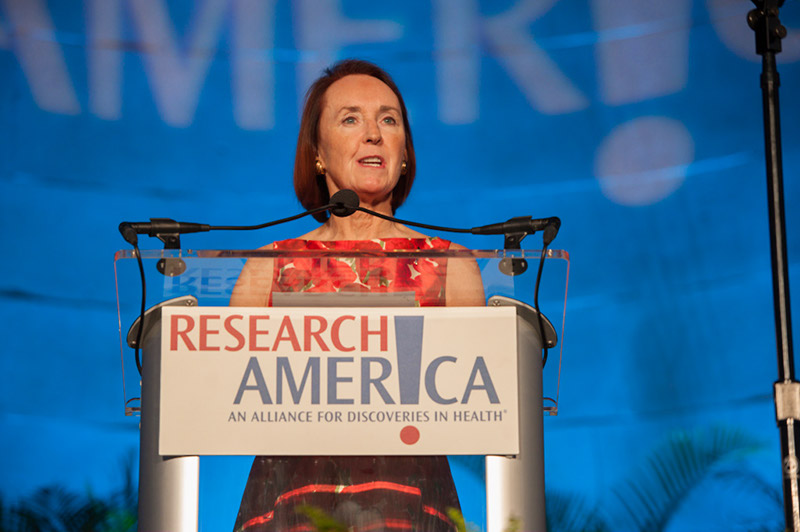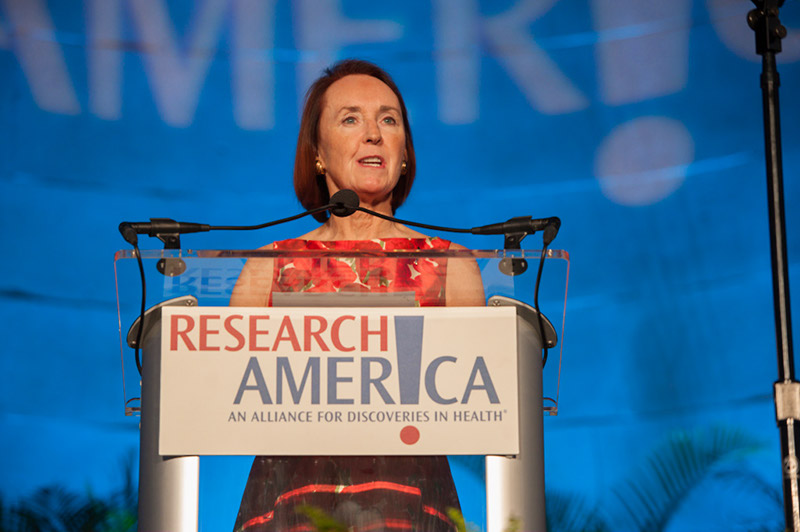Not Too Much to Hope

 Dear Research Advocate,
Dear Research Advocate,
President Trump addressed a joint session of Congress on Tuesday evening. With his heartfelt recognition of Megan Crowley and Rare Disease Day, and his vision that “[achieving] cures to illnesses that have always plagued us are not too much to hope,” the President demonstrated his commitment to faster medical progress. In 2013, we honored Megan’s father, John Crowley, with the Gordon and Llura Gund Leadership Award for his outstanding efforts to accelerate new treatments for Pompe disease, which afflicts Megan. Speaking for all the parents and all the patients who are waiting, we say it’s not too much to hope that we will see the President’s priority for finding cures reflected in his budget blueprint.
Finding solutions to what ails us — for the 7,000+ rare diseases and those like Alzheimer’s, cancer, diabetes and heart disease which are all too prevalent — is not only about speeding FDA approvals, per se, as the President’s remarks suggested. We urge recognition that to ensure the safety and efficacy of new drugs and treatments, the FDA needs adequate resources to fulfill its mission (see also our statement). The FDA compares favorably to other nations in number and timeliness of reviews, despite externally imposed challenges including hiring restrictions and funding resources. We urge HHS Secretary Tom Price and OMB Director Mick Mulvaney to take a close look at those challenges as well as the multiple layers of departmental and OMB review that FDA must clear before taking action, and evaluate whether all this extra red tape is warranted.
In advance of releasing his budget later this month, the President has signaled his interest in boosting the defense budget by $54 billion. Representative Tom Cole (R-OK-4), Chair of the House Subcommittee on Labor-H Appropriations, has pointed out that were the Congress to adopt such a blueprint without new sources of revenue, $18-20 billion would have to come from the Labor-H bill alone. Projected cuts would have a devastating impact on research, public health, prevention programs, and much more.
But we are a bit ahead of ourselves with such a doomsday prediction. While the President provides guidance and presents his priorities, it is the Congress that determines funding based on often-conflicting demands. I cannot recall a year in which Congress simply adopted the President’s budget, regardless of what party is in the majority. Chairman Cole said in an op-ed that ran the day the President addressed Congress that “there are many knotty issues that must be resolved with respect to all these points in [the President’s] agenda.” We can all hope that Congress recognizes the impact that cuts this significant could have on the health and wellbeing of our nation, but it’s better to bolster our hope by taking action.
As stakeholders and advocates, we must all communicate our priorities to Congress and the Administration and do so now. Let’s remind our elected officials that there are many more individuals like Megan Crowley who can’t wait much longer for the research and innovation that will provide solutions to what ails us.
Finally, I salute a great pioneer, former Research!America board member, and mentor to many, myself included. We remember Eugene Garfield, who died on February 26 at age 91, as the “father” of the impact factor, the science citation index, and as one who was prescient about the importance of health economics. Dr. Garfield was the founding supporter of Research!America’s Garfield Economic Impact Award, created to recognize and help support outstanding research demonstrating the economic impact of medical and health research, including innovations in study methodology, policy impact, prevention, disease treatment, and health care delivery. I extend condolences to his family, friends and colleagues. We will all long remember and celebrate his legacy.
Sincerely,
Mary Woolley




